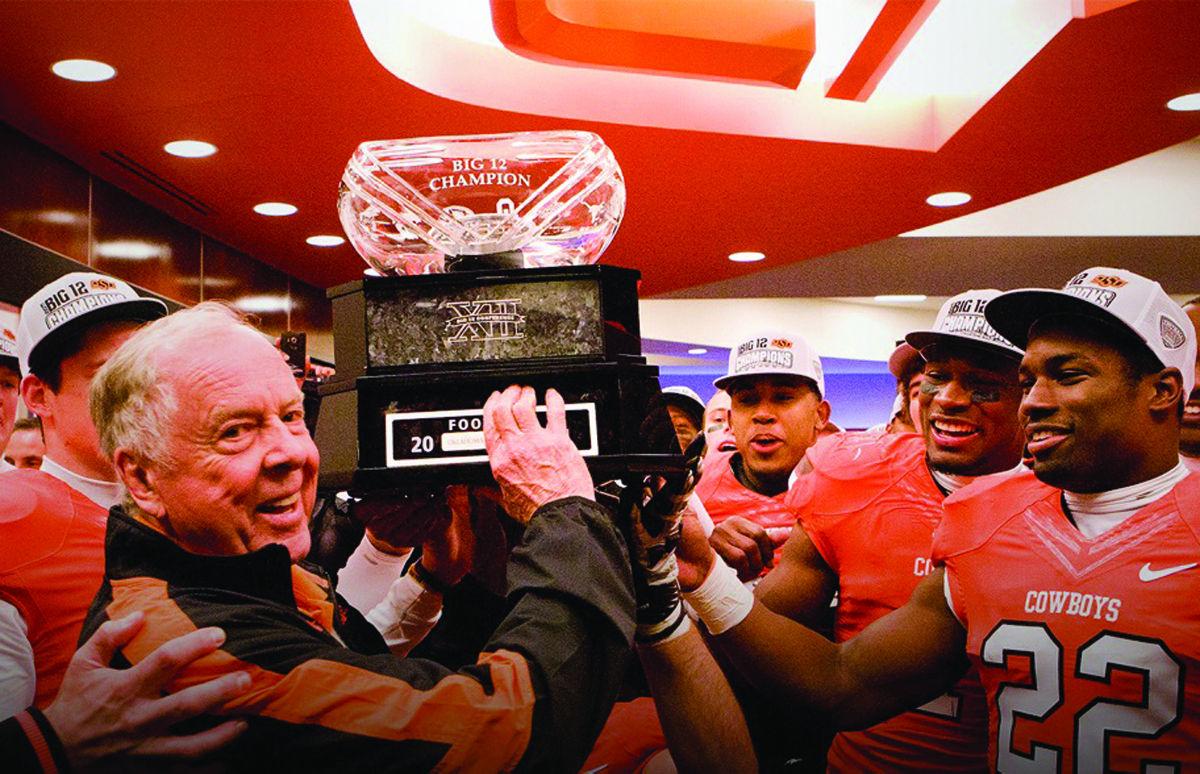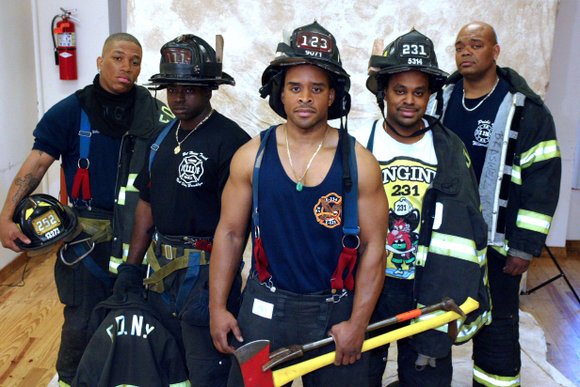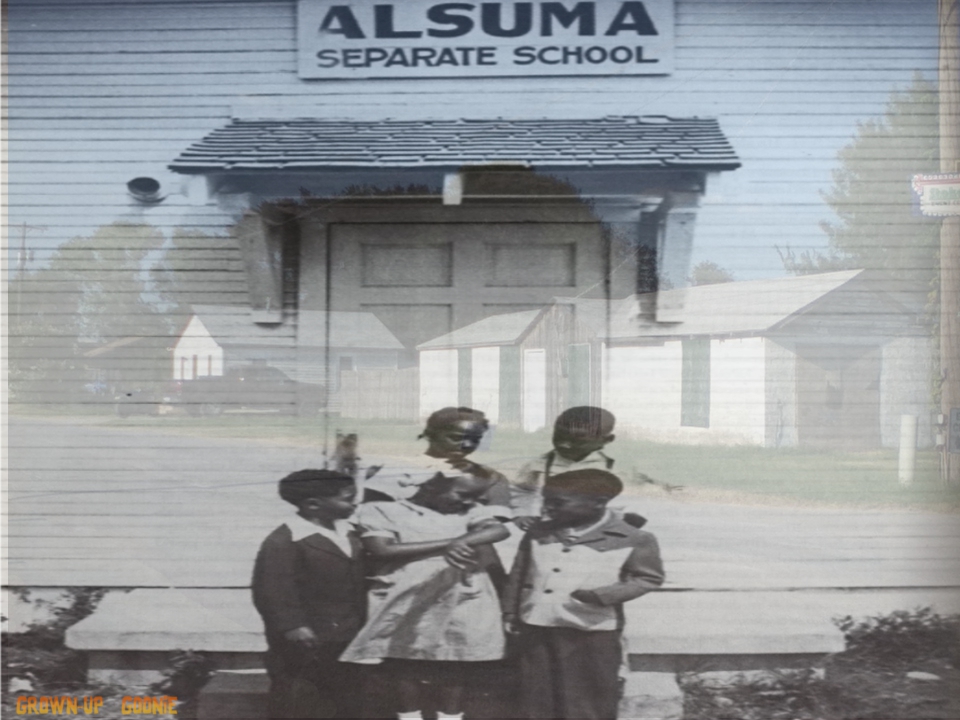
By Cheryl Hall
T. Boone Pickens, legendary energy executive, philanthropist, ardent Oklahoma State University supporter and one of America’s most famous entrepreneurs, died peacefully Wednesday of natural causes at his home in the Vendome. He was 91.
Pickens had an energy career that went from laborer to corporate take-over raider to tycoon to business soothsayer. He was among the few business elites granted “dual citizenship” on both sides of the Red River.
L.A. movie producers would have been hard-pressed to create an exaggerated Hollywood version of the real-life man.
“Ralph Waldo Emerson said, ‘Do not go where the path might lead, but instead go instead where there is no path and leave a trail.’ That was Boone,” said retired banker Alan White, one of Pickens’ closest friends. “Boone was always going some place where there was no path. He left trails all of his life. Many of us had the good fortune of being able to follow along with him.”
Pickens is the third Dallas business icon to die this year — following the deaths of Herb Kelleher in January and Ross Perot Sr. in July.
“Herb, Boone and my father were members of our society who will never be replaced,” said Ross Perot Jr. “They were unique, quality, driven men who had larger-than-life personalities and who made a huge, positive impact on our community and our country.
“I feel so blessed that the Lord allowed me to know a man like Boone Pickens.”
Plans for memorial services in Dallas and Stillwater, Okla., are pending. Pickens will be buried at Karsten Creek Golf Club, home to the OSU golf team.
Born in Holdenville, a small town in eastern Oklahoma, Pickens spent his adult years as a longtime resident of Dallas and his massive Mesa Vista Ranch in the Panhandle.
/arc-anglerfish-arc2-prod-dmn.s3.amazonaws.com/public/WHRHQBX3UJAA52QX7KJKUMSPTE.jpg)
1/2Three-year-old Boone Pickens is a newspaper boy in training at his home in Holdenville. Throwing his hometown newspaper gave Dallas’ iconic oilman his entrepreneurial itch.(T. Boone Pickens Archives)
/arc-anglerfish-arc2-prod-dmn.s3.amazonaws.com/public/4AOBSMLWDRO4ESWQICFJ56GXYM.jpg)
2/2A 13-year-old Boone Pickens holds his cat, Sandy, in 1941, the year after he started his newspaper route.(T. Boone Pickens Archives)
George W. Bush, Dick Cheney, Nancy Reagan, Ted Turner and George Strait were among the notables Pickens hosted at his beloved 68,000-acre ranch, which is miles upon miles of mesas, man-made lakes and rivers, and pristine wildlife habitat.
In late 2016, Pickens suffered the first of a series of small strokes that affected his speech. In mid-July 2017, he had what he called “a Texas-size fall” that landed him in the hospital and sidelined him from most public appearances.
It was quite a setback for “the Oracle of Oil” who was known for his verbal soothsaying. But he continued to make his opinions known, using Twitter and LinkedIn as his bully pulpit.
Pickens’ closest cronies were three fellow Dallas transplants who became local powerbrokers: retired PlainsCapital chairman White, Dallas Cowboys owner Jerry Jones and beer distributor Barry Andrews.
“Boone was stubborn. He was tough,” said White. “He had more charisma than anyone I’ve ever known. He was billionaire rich, and he went broke two or three times. But every time that he was knocked down on his knees, he got back up, dusted himself off and went right back at it.”
Large-scale downscaling
Troubled by his health issues, Pickens began to downsize in the fall of 2017 when he put his Mediterranean-style Preston Hollow estate up for sale, asking $6.5 million for the 8,906-square-foot home. It sold for an undisclosed sum the following March.
Two months later, he put a $250 million for-sale sign on Mesa Vista, saying he wanted to make sure it was sold to someone who would carry on his conservation efforts there.
But he didn’t really try too hard to sell it. He continued to spend most weekends there, entertaining friends and family or holding political and nonprofit conferences.
In January 2018, he announced that he had stepped away from his hedge-fund business, BP Capital Management, and other investment entities, which had combined assets of under $1 billion at year-end 2017.
Didn’t go gently
Pickens was known for mixing humor with the most serious of topics.
In 2017, he said he had switched back to the United Methodist Church after having become a Presbyterian along with his first marriage.
“Dad told me, ‘Before you try to get into heaven, get back into the Methodist church. You won’t be viewed as favorably as you think in heaven if you show up as a Presbyterian,’ ” Pickens said at the dedication of the T. Boone Pickens Hospice and Palliative Care Center owned by Presbyterian Communities. “So this will be my last gift to Presbyterians. I’ve now moved over to Methodist. So I’m prepared to go.”
That was a lie.
He fought vigorously to improve his speech, memory and his mobility.
His last big celebration was in May 2018, when nearly 500 well-wishers showed up for his 90th birthday. The guests were asked to wear OSU bright orange, transforming the Dallas Country Club into a sea of his beloved alma mater’s color.
/arc-anglerfish-arc2-prod-dmn.s3.amazonaws.com/public/VDKGXUAHL2NQRTRVLAVVLCF2FQ.jpg)
Jerry Jones wore an orange tie despite his allegiance to the University of Arkansas Razorbacks’ red.
Even White, a diehard Texas Tech Red Raider fan, wore an orange sports shirt that he had made just for the occasion.
“I’ll never wear it again but for him,” White said at the party. “I’ve got a pair of orange socks on that I didn’t know I had. I really pains me. But it’s only once every 90 years that I have to do this.”
White said he plans to pull out the ensemble from the back of his closet for Pickens’ memorial.
‘Greenmailer’ becomes icon
He was born Thomas Boone Pickens Jr. but grew up as Boone at his mother’s insistence even though he disliked his middle name. As an adult, he reattached the T. to his moniker.
During his seven decades in the energy industry, Pickens’ face was featured on the cover of just about every significant business publication in America.
He was a regular on CNBC’s Squawk Box and MSNBC’s Morning Joe.
While getting spruced up to go on TV appearances, Pickens would tell the makeup artist that he’d fork over $100 if they could guess his age. They always undershot. The only time he had to pay off was when he tried it on the same person twice.
When T. Boone Pickens spoke, people listened.
But that wasn’t always the case.
During the 1980s, Pickens became a well-known corporate raider — a term he despised — making a string of losing but profitable takeover runs at Gulf Oil, Unocal and Dallas-based Diamond Shamrock.
/arc-anglerfish-arc2-prod-dmn.s3.amazonaws.com/public/WB6NB52X53GIC4GGQLAYUU63M4.jpg)
1/2Pickens and two investors started Mesa Petroleum, which he took public in 1964 and turned into one of the U.S.’ largest oil and gas companies.(Evans Caglage / The Dallas Morning News)
/arc-anglerfish-arc2-prod-dmn.s3.amazonaws.com/public/Q56676GSRGDC7UX6CGKYA5WOXY.jpg)
2/2 T. Boone Pickens in his Amarillo office in 1984.(Evans Caglage / The Dallas Morning News)
In 1986, Pickens founded the nonprofit United Shareholders Association to help shareholders fight what he saw as rampant corporate abuses.
Bobby Stillwater, his attorney for 50-plus years, recalled how Pickens was shunned by business establishment — most notably by the Business Roundtable and its major corporate CEO members throughout the country.
“They convinced their commercial and investment bankers not to do business with us,” said Stillwater, who retired as BP Captial’s general counsel in 2013 but still helps with Pickens’ philanthropic and personal estate affairs. “They made it very hard for us to finance a deal. They just dogged Boone all over the country. Any place where he gave a speech, they’d give an anti-Boone one.”
One group tried to get Pickens booted from Augusta National Golf Club, home to the U.S. Masters Tournament, which Pickens joined in 1982. But Pickens’ powerful friends came to his defense.
“Otherwise, they would have thrown his ass right out of there,” Stillwater said with a laugh. “They did everything they could to derail Boone Pickens, but he won. He was on the right side of the issues. He was a very focused, dogged guy who said, ‘By God, I’m right, and I’m going to keep going.’ “
Pickens’ reputation as a “greenmailer” made him an outlier in Dallas establishment circles when he moved here from Oklahoma in 1989. Many local bankers refused to loan him capital. Others refused to socialize with him.
He had the last laugh. His proclivity to make money, lose some of it and bounce back, along with his homespun wit and remarkable generosity, won over the town and media everywhere.
90% Club
Pickens wasn’t a billionaire when he died, with his last reported net worth standing at a mere $500 million. That’s because he’d given away more than $1 billion to philanthropic and educational causes.
“I like making money. I like giving money away. Giving money is not as fun as making it, but it’s a close second,” Pickens liked to say.
Just as Pickens loved to leverage business deals, he used innovative matching initiatives that doubled his philanthropic gifts to more than $2 billion.
/arc-anglerfish-arc2-prod-dmn.s3.amazonaws.com/public/EWRYJXJHAIJJGFY3SEFIQDEGLY.jpg)
1/2T. Boone Pickens with his second wife, Bea Pickens, with Laura and Gov. George W. Bush at the Gridiron show benefiting the Press Club of Dallas. (Joe Laird / The Dallas Morning News)
/arc-anglerfish-arc2-prod-dmn.s3.amazonaws.com/public/VY75ACB276W6NLQL3SUBKT2HIA.jpg)
2/2Ross Perot Sr., T. Boone Pickens and Ross Perot Jr. at Perot headquarters in 2018.(Courtsey Ross Perot Jr.)
A good example of that was when he and his troops hatched a plan in 2007 for his foundation to give $50 million each to the University of Texas M.D. Anderson Cancer Center and the University of Texas Southwestern Medical Center — for a total of $100 million.
But there were strings attached. Both institutions had to multiply his gift tenfold to $500 million in 25 years from earnings on the original principal and new outside donations. They both met that deadline with a decade or two to spare.
In an article in Forbes, Pickens pledged to leave 90% of his net worth to charity when he died, said Jay Rosser, his longtime chief of staff.
“Bill Gates called asking him to be a member of the Giving Club [where rich people pledge to bequeath the majority of their wealth to philanthropy].” Rosser recalled. “Boone said, ‘Happy to do it.’ Then he invited Bill to join him in his 90% Club. Bill said, ‘No, I’m fine with doing what I’m doing.’ “
It could have been A&M
Over the years, the largest chunk of Pickens’ philanthropy — $525 million — was bestowed to OSU, almost evenly divided between academics and athletics at Stillwater, where the football stadium bears his name.
/arc-anglerfish-arc2-prod-dmn.s3.amazonaws.com/public/ZSQT2L7AAVGCQCTAIK7CB5QFCI.jpg)
1/4T.Boone Pickens Jr. shook Dez Bryant’s hand as he made the rounds greeting all Oklahoma State University players before their game against The University of Georgia at Sanford Stadium in Athens, Ga., in 2007.(Nathan Hunsinger / The Dallas Morning News)
/arc-anglerfish-arc2-prod-dmn.s3.amazonaws.com/public/673EX7N6XRPHVEI6HPULV3ZVWQ.jpg)
2/4Oklahoma State Cowboys fans sported large cutouts (from left) of actor Chuck Norris, actor Zach Galifianakis and OSU alum T. Boone Pickens before a game with Oklahoma at Boone Pickens Stadium in Stillwate in 2011.(Tom Fox / The Dallas Morning News)
/arc-anglerfish-arc2-prod-dmn.s3.amazonaws.com/public/GQD2URPS6FRYCYSWZKY4BUWU24.jpg)
3/4Pickens, center, arrives for a town hall meeting at Oklahoma State University’s Gallagher-Iba Arena in Stillwater in 2009. Pickens was promoting the Pickens Plan, a grass-roots alliance that promotes the use of wind and natural gas power to reduce dependence on foreign oil.(Shane Bevel / Bloomberg)
/arc-anglerfish-arc2-prod-dmn.s3.amazonaws.com/public/SQTRR2OZQQT3L6DBCESIINIHEQ.jpg)
4/4T. Boone Pickens took his first selfie at an OSU homecoming game in 2015.(T. Boone Pickens)
Pickens’ largesse to OSU prompted Texas A&M’s 12th Man Magazine to label A&M’s decision not to renew Pickens’ $25-a-month freshman basketball scholarship as one of the top 10 mistakes in Aggie history.
Because of that tuition slight, Pickens transferred to OSU (then Oklahoma A&M), where he earned a degree in geology in 1951.
Talk about a self-inflicted Aggie joke.
In 2006, Pickens formed his T. Boone Pickens Foundation, focusing on health and medical research and services, at-risk youth, and educational, entrepreneurial, political and athletic initiatives.
Over the years, Pickens gave $2 million to the VNA Dallas’ Meals on Wheels. He spent many Christmas and Thanksgiving days delivering turkey dinners to recipients who had no clue who the delivery guy was.
As Pickens left, he’d hand them a crisp hundred-dollar bill, saying it was from Santa Claus.
Today Pickens’ name is on more than a dozen buildings and facilities in North Texas, including the YMCA in downtown Dallas, the biomedical building at the University of Texas Southwestern Medical Center, Texas Woman’s University’s Institute of Health Sciences-Dallas Center, the dinosaur floor of the Perot Museum of Nature and Science and Baylor Health Care System’s cancer center.
/arc-anglerfish-arc2-prod-dmn.s3.amazonaws.com/public/27VLU3S4NG7BNFUFEZNGE35P7U.jpg)
The T. Boone Pickens Virtual Learning Center at the Center for BrainHealth honors his $11.5 million in donations since his first gift in 2006.
But just as important to the fledgling center was Pickens’ influence on other powerbrokers. He hosted CEOs from around the country at periodic BrainHealth Summits at Mesa Vista — vastly increasing the center’s visibility, said Sandra Bond Chapman, founder and chief director of the University of Texas at Dallas’ cognitive research institute.
“Boone told me, ‘This is one of the greatest investments I have ever made in terms of ROI to humanity and new discoveries,’ ” she said.
Pickens was among the first guinea pigs for its BrainHealth Physical — allowing the center to assess how his brain was functioning.
Chapman wasn’t the least bit surprised by the findings of his 79-year-old’s gray matter. “It showed that Boone had an ultimate brain — a younger working brain with vast cognitive prowess combined with the expertise and wise decision-making of a mature brain and a retained penchant for innovation and risk-seeking,” she said.
Tossing with both hands
Pickens credited his early days as a newspaper boy for the Holdenville Daily News for giving him a leg up in the world of entrepreneurism.
As a teen, he expanded his newspaper route by acquiring surrounding routes, one by one.
“I ended up with 154 papers before I was through,” Pickens said in 2016. That came to about $38 a month since the paper didn’t publish on Saturdays. “Let me tell you, when I was 12 years old, that meant real money in my pocket. This was during the Depression.”
But his proudest accomplishment was his ability to throw from either hand.
Some would say he did that in the energy business, too.
Pickens once told The News that his father gave him the best piece of advice: A fool with a plan can beat a genius with no plan. “I was dragging my feet in life and taking my time in college. That’s when he sprung that line on me,” he said in 2017. “Hit me so hard I almost didn’t hear the last part of it: ‘And, son, your mom and I are concerned we have a fool with no plan.’ “
He got the message.
While at OSU, Pickens worked as a roughneck and in a Texaco refinery. After graduating in 1951, he worked as a geologist for Phillips Petroleum for three years but got crosswise with the oil company’s bureaucracy.
With $2,500 of borrowed money, Pickens and two investors formed an oil and gas firm that eventually became Mesa Petroleum, which he took public in 1964. Pickens built Mesa into one of America’s largest independent natural gas and oil companies.
In 1996, Pickens was pushed out of Mesa in a messy power play after having served nearly four decades at its helm.
/arc-anglerfish-arc2-prod-dmn.s3.amazonaws.com/public/TYPA5NNDA5UK3XEAWPWVG2ORMI.jpg)
1/3T. Boone Pickens at his ranch northeast of Amarillo.(Brad Loper / The Dallas Morning News)
/arc-anglerfish-arc2-prod-dmn.s3.amazonaws.com/public/F7WPOZRM5NQ2PSPINJRCJPKW74.jpg)
2/3Pickens was photographed in his Dallas office in 2008 after he gave the Museum of Nature and Science $10 million. (Lara Solt / The Dallas Morning News)
/arc-anglerfish-arc2-prod-dmn.s3.amazonaws.com/public/IG4UGNP5A2K44DJL6DCWVAOKMM.jpg)
3/3Pickens delivered a keynote address during the National Clean Energy Summit at the Cox Pavilion at the University of Nevada Las Vegas in 2008. (Ethan Miller / Getty Images)
“Walking out, I had a goal headline: ‘The Old Man Makes a Comeback,’ ” Pickens recalled in 2017.
It was prescient. Pickens became a billionaire six years later.
Pickens was a bit of a wildcatter at heart when it came to his personal life, too.
All five of his marriages ended divorce. His most recent, to Toni Chapman Brinker, widow of legendary Dallas restaurateur Norman Brinker, ended in 2017 after less than four years.
In recent years, Pickens rekindled his relationship with his third wife, Nelda Pickens.
Pickens had five children: Deborah Pickens Stovall, Pam Pickens, Michael Pickens, Tom Pickens and Liz Pickens Cordia; 11 grandchildren; and three great-grandchildren.
Swift Boat misstep
Pickens took politics personally, mostly with a Republican point of view.
He was Texas’ finance chairman for Ronald Reagan’s 1980 presidential campaign and donated $10 million to the Ronald Reagan Presidential Library in 2005 to underwrite its Air Force One Pavilion.
Pickens’ most notorious political foray was as a leader of the Swift Boat attacks — along with fellow Dallas billionaires Sam Wyly and the late Harold Simmons — against John Kerry in 2004, which was discredited as a smear campaign.
Pickens would later publicly endorse climate-change legislation authored by Kerry, but he never really apologized for his participation in Swift Boat.
Pickens wrote two New York Times best-sellers: his 1987 biography, Boone, and The First Billion is the Hardest, his treatise on how the United States could free itself from its dependence on OPEC oil, published in 2008.
/arc-anglerfish-arc2-prod-dmn.s3.amazonaws.com/public/ND53BDLQFNIYV76FLVFSBDDFPI.jpg)
That same year, Pickens launched his self-funded, $100 million grass-roots campaign aimed at reducing America’s crippling addiction to OPEC oil by boosting U.S. adopting wind, solar and especially natural gas.
“In 2008, when Boone was 80 years old,” Rosser said, “he stress-tested and launched the Pickens Plan, wrote and published a book, and, at the company, somehow weathered one of the greatest financial collapses in American history.
“That was a pretty big year.”
When BP Capital’s stock crashed along with oil and gas commodities in 2008, Pickens shored up his commitment to OSU with cash from his pocket.
“That’s when we really, really found out who Boone Pickens was,” said OSU athletic director Mike Holder. “Not only did OSU have catastrophic losses, but he personally had catastrophic losses.
“He was there in the best of times. Sure, everybody is. But in the worst of times, that’s when he stood tallest, Holder said.
“Jerry Jones once said, ‘If Boone Pickens tells you that a goose can pull a wagon, start loading the wagon.’ That pretty much sums it up.”
Eternal optimist
After his big fall in 2017, Pickens reflected on his life on LinkedIn in what was his own eulogy of sorts.
“Just a year ago I felt immortal, wearing my age with pride, even joking about it. Last year I opened a speech with this: ‘The other day, I turned 88 and realized my life was half over.’ I refused to call my 2008 autobiography Life in the Fourth Quarter because, well, hell, I wasn’t in the fourth quarter. But things have changed for me since the strokes. I clearly am in the fourth quarter, and the clock is ticking and my health is in decline, much as it is with others in my stage of life.
/arc-anglerfish-arc2-prod-dmn.s3.amazonaws.com/public/WVGPCWRCXBUHJ2XJEO7HJ5XLL4.jpg)
1/3Pickens kicked back on his almost weekly plane ride to Mesa Vista Ranch, a 68,000-acre piece of property he turned into a bird hunting sanctuary in the panhandle of Texas near the town of Miami. (Tom Fox / The Dallas Morning News)
/arc-anglerfish-arc2-prod-dmn.s3.amazonaws.com/public/H5LKN6AVHEUPVOGHSJDBFWCGOU.jpg)
2/3Pickens had his Holdenville, Okla., boyhood home moved and restored to Mesa Vista Ranch. In 2017, he donated it and moved it to his alma mater, Oklahoma State University in Stillwater.(Tom Fox / The Dallas Morning News)
/arc-anglerfish-arc2-prod-dmn.s3.amazonaws.com/public/6H245K7DLVPM5VH6C7RQ54EZ5Q.jpg)
3/3Pickens posed in 2017 at a spot overlooking a series of manmade lakes leading from The Lake House to The Lodge on his Mesa Vista Ranch in the panhandle. The ranch took nearly 10 years to build, including the stone aqueduct shown in the background. (Tom Fox / The Dallas Morning News)
“Now don’t for a minute think I’m being morbid. Truth is, when you’re in the oil business like I’ve been all my life, you drill your fair share of dry holes, but you never lose your optimism.
“There’s a story I tell about the geologist who fell off a 10-story building. When he blew past the fifth floor, he thought to himself, ‘So far so good.’
“That’s the way to approach life. Be the eternal optimist who is excited to see what the next decade will bring … I’m fond of ‘Boone-isms.’ Number 15 on my list is this: ‘Don’t ever let age be an obstacle.’ And I won’t.”
And he didn’t.
Boone-isms
“Be willing to make decisions. That’s the most important quality in a good leader.”
“Don’t fall victim to what I call the ‘ready-aim-aim-aim-aim’ syndrome. You must be willing to fire.”
“Show up early. Work hard. Stay late. Work eight hours and sleep eight hours, and make sure they are not the same eight hours.”
“I told a friend, ‘This is the kind of market that builds character.’ He looked at me and said, ‘If it gets any worse, you’ll have more character than Abe Lincoln.’ “
“My mother once told me, ‘Son, you talk too much. You should listen more. You don’t even know who the enemy is.’ “
“If you’re on the right side of the issue, just keep driving until you hear glass breaking. Don’t quit.”
“Play by the rules. It’s no fun if you cheat.”
/arc-anglerfish-arc2-prod-dmn.s3.amazonaws.com/public/UKAICBTTM2UCIDEKN7LBP4XRPM.jpg)
1/2T. Boone Pickens is shown in his Dallas offices in May 2019. (Smiley N. Pool / The Dallas Morning News)
/arc-anglerfish-arc2-prod-dmn.s3.amazonaws.com/public/WWHVMMBLHKF4Q72WUE4APVRQEQ.jpg)
2/2Pickens outside the living quarters near The Lodge at Mesa Vista Ranch.(Tom Fox / Staff Photographer)









